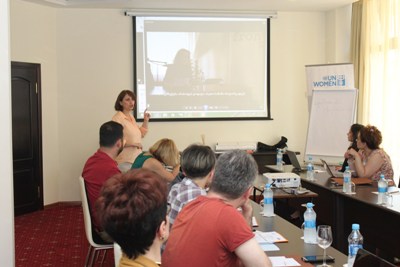Reporting on Women’s and Girls’ Issues in Conflict and Post-conflict Settings
Date:

Photo: Institute for War and Peace Reporting
For three days, the participants had a chance to discuss professional standards of gender-sensitive reporting from conflict and post-conflict settings. The participants familiarized themselves with local and international standards of ethical and gender-sensitive reporting, self-regulation and accountability mechanisms, international best practices of covering internally displaced persons’ issues.
“It was a very interesting training, which made think and reconsider things from a different perspective. We will definitely use this knowledge in our journalistic work”, - said Tatia Khaliani, a journalist from "Liberali".
The training was organized in the frameworks of UN Women project “Women for Equality, Peace and Development”, implemented with the financial support of the government of Norway.